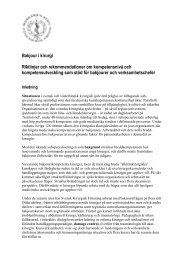Utbildningsboken revision 120808.pdf - Svensk Kirurgisk Förening
Utbildningsboken revision 120808.pdf - Svensk Kirurgisk Förening
Utbildningsboken revision 120808.pdf - Svensk Kirurgisk Förening
You also want an ePaper? Increase the reach of your titles
YUMPU automatically turns print PDFs into web optimized ePapers that Google loves.
93<br />
Utbildningsbok – Kirurgi<br />
Primary care Medical Centre medical centre with out-patient clinical activities in a<br />
primary care centre<br />
care-team work work where the Resident under supervision participates<br />
and sometimes leads a group of collaborative health care<br />
personnel with different skills aiming to care for<br />
individuals or a group of patients<br />
Overall competence definition<br />
Definition of terms<br />
The specialty of surgery includes injury and illness in the gastrointestinal<br />
organs, the breasts, the skin and subcutaneous tissue as well as the endocrine glands in the<br />
neck and the abdomen in patients of all ages who may need treatment with surgical methods.<br />
Assessment of symptoms and knowledge of the pathophysiology, diagnosis and pre- and<br />
postoperative assessment also play a central role, as does the acute treatment of multi-trauma.<br />
Multidisciplinary collaboration is a prerequisite for acquiring these skills.<br />
Surgery is the base speciality for the branch specialties of urology, paediatric<br />
surgery, plastic surgery and vascular surgery.<br />
Qualifications<br />
Medical skills<br />
For specialist competence in surgery a mastery of surgical pathophysiology,<br />
basic surgical techniques, initial trauma management, acute surgical diseases of adults and<br />
children, basal nutrition, basal pain management, basic knowledge of surgical intensive care<br />
and the effects of anaesthesia are required. This constitutes the common knowledge base with<br />
the branch specialties (aims 1-4).<br />
As a specialist in general surgery it is also necessary to master the diagnostic<br />
and surgical techniques for patients with hernias, and to be able to handle patients with<br />
diseases of the upper and lower gastrointestinal tract. It also includes having knowledge of the<br />
assessment, diagnosis and treatment of surgical conditions of the endocrine glands and breast,<br />
and to initially handle injuries and diseases in the peripheral vasculature and urinary tract.<br />
Qualification criteria for communicative competence, leadership skills and<br />
expertise in medical science and quality work<br />
Communicative competence<br />
The equitable and responsible patient<br />
The surgical specialist should have the capacity for dialogue and an open<br />
contact with the patient and his/her family. This should be characterized by empathy and trust<br />
as well as respect for patients' rights to information, influence and participation in decisions.





